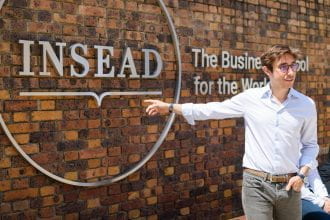
Left to right: Joseph Tanbuntiong, Washington SyCip, Ilian Mihov, Leo Cloma and Fernando Zóbel de Ayala.
The launch of a new fundraising initiative provides an interesting glimpse into the origins of INSEAD’s present-day success…
“When Dean Ilian Mihov made it clear that INSEAD needed more support for its next period of growth,” says Fernando Zóbel de Ayala CIM’93, “I wanted to find a way of giving that was relevant to my country.” And so began an initiative to raise €750,000 for a scholarship fund in honour of Washington SyCip for Filipino MBA students.
But the real story begins back in the 1970s, when Mr SyCip, an accountant and business leader from the Philippines, met Henri-Claude de Bettignies, a young professor at INSEAD with a passion for Asian business. It was the two men’s determination to found a successful Euro-Asia Centre in Fontainebleau that eventually led to the creation of INSEAD’s Asia Campus in Singapore.
“We established the centre to pass knowledge from Europe to Asia,” recalls Mr SyCip, now in his mid-nineties. “But it took us some time to persuade companies to accept the idea. And the last few years have proved beyond doubt that it was the right idea.” Indeed, it was arguably the idea that has taken INSEAD to its current number-one spot in the Financial Times MBA rankings.
“INSEAD’s presence in Asia today owes much of its success to the unwavering support of Mr SyCip,” says Mr Zóbel de Ayala, explaining the decision to name the scholarship after him.
The personal and economic impact of an INSEAD education
But why did he decide to launch the fund in the first place? “I was struck that in the global mix of students at INSEAD, Filipinos were always under-represented,” he answers. “By contributing to a fund for Filipinos and encouraging others to do the same, I’m hoping that more Filipinos will get a chance to have an INSEAD education.”
It’s a message wholeheartedly echoed by Tony Tan Caktiong, Chairman of the Jollibee Group Foundation, which is the scholarship’s other seed funder. “It is our hope and belief that when Washington SyCip scholars come back to the Philippines, they will run businesses that help their fellow Filipinos and contribute to nation building,” he says.
Leo Cloma MBA’98J, CFO of NutriAsia and President of the Philippines National Alumni Association explains, “Culturally and historically, the Philippines is very US-oriented,” he explains. “And today US business schools are very generous with scholarships. But only INSEAD provides the truly international perspective that Filipino business needs.”
Mr Tan Caktiong’s son, Carl a graduate from the Class of MBA’10J, is living proof of this. “As parents, we value the high-quality education that Carl received from INSEAD,” says his father. “He is now leading our company’s business in China.” Mr Zóbel de Ayala agrees that his Executive Education programme at the Euro-Asia Centre was a formative influence in his own career, helping him with the knowledge, skills and international perspectives needed for more senior responsibilities and business growth.
INSEAD’s commitment to business as a force for good is particularly relevant for developing countries like the Philippines, where there is still work to be done to raise living standards. “Governments have been unable to provide all the services and infrastructure necessary,” explains Mr Zóbel de Ayala. “The private sector is showing that it can provide many of the solutions needed at affordable prices.”
A win-win initiative
MBA graduates from developing countries are certainly very much in demand with INSEAD recruiters. As Jim Dawson, Interim co-Associate Dean of Advancement and Alumni Relations, says: “We hear from the companies hiring INSEAD graduates that they love our pool of students from emerging economies. Anecdotally, unlike those who choose US schools, they seem much keener to return and create value for their home countries.”
“And for graduates working internationally, we hope they will showcase the intelligence, work ethic and value that Filipino talent can bring to the world,” adds Mr Tan Caktiong.
The benefits to INSEAD are also significant in that the scholarship will help to recruit some of the brightest minds from one of Asia’s rising stars. Currently ranked the 39th largest economy in the world, the Philippines is projected to rise to 16th place by 2050. “There still only around 50 of us INSEAD graduates in the Philippines,” says Leo Cloma. “Our numbers are growing but slowly. If we don’t accelerate the snowball effect by giving to the Washington SyCip Scholarship Fund, the best students will continue to go to the US.”
The goal is therefore to provide several full-tuition scholarships each year – an ambitious undertaking for such a small group of alumni but a challenge they are rising to with enthusiasm and early success. The two generous commitments from the Ayala Foundation and the Jollibee Group Foundation have already taken the fund two-thirds of the way towards the target.
Leo’s message to fellow Filipino alumni of all programmes – and their parents – is clear: “We can’t go back and have the time of our lives at INSEAD again, but the next best thing is to enable others to do the same thing… maybe one, two, three, four or more a year. Who knows? It depends on how much we can raise.”
Just consider the impact a decision to give today could have many years from now. As Washington SyCip himself says, “I’m so happy that a decision I made so long ago has helped to make INSEAD number one.”
To contribute to the Washington SyCip Scholarship Fund or to discuss creating a similar initiative for your own country, please contact Jim Dawson


